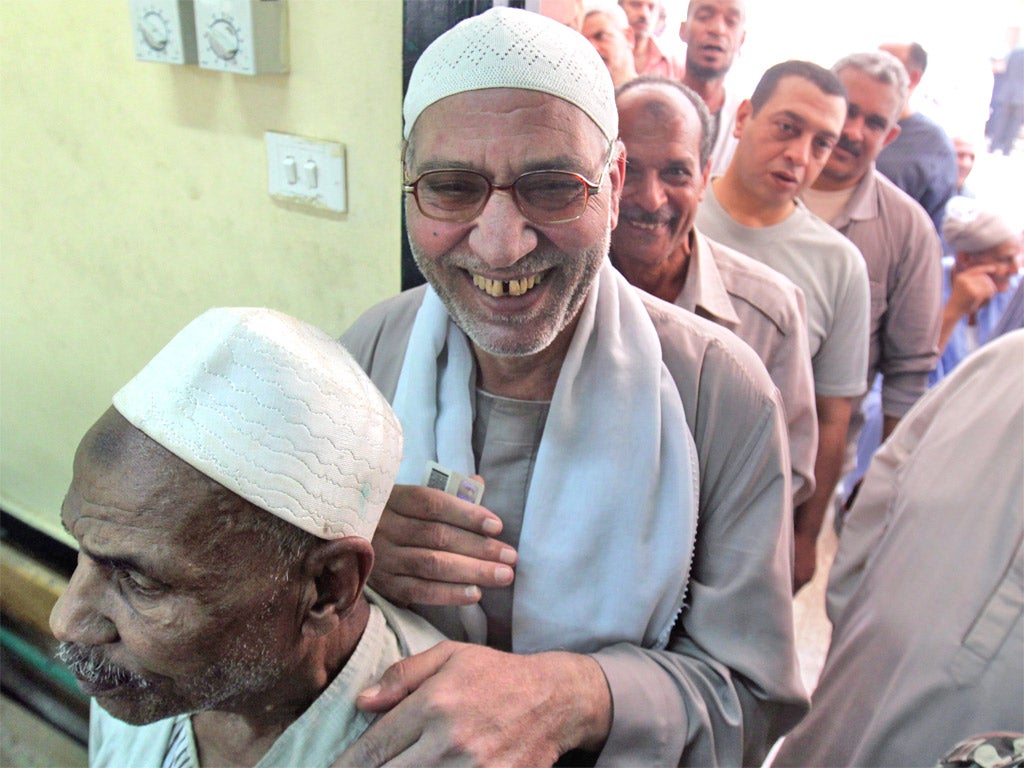A moment of truth for the Arab Spring as 50 million vote in Egypt
Nation's first democratic election brings long queues – and a contest that's too close to call

Your support helps us to tell the story
From reproductive rights to climate change to Big Tech, The Independent is on the ground when the story is developing. Whether it's investigating the financials of Elon Musk's pro-Trump PAC or producing our latest documentary, 'The A Word', which shines a light on the American women fighting for reproductive rights, we know how important it is to parse out the facts from the messaging.
At such a critical moment in US history, we need reporters on the ground. Your donation allows us to keep sending journalists to speak to both sides of the story.
The Independent is trusted by Americans across the entire political spectrum. And unlike many other quality news outlets, we choose not to lock Americans out of our reporting and analysis with paywalls. We believe quality journalism should be available to everyone, paid for by those who can afford it.
Your support makes all the difference.Egyptians made history yesterday as millions of people queued up outside polling stations for a presidential election that many are hoping will end more than five decades of successive dictatorships.
Long lines of voters began snaking out of schools and colleges early yesterday morning, as ordinary Egyptians turned out to cast their ballot in what is still very much an open race to elect a successor to Hosni Mubarak, who was ousted by last year's revolution.
"This is a new experience for all the Egyptian people," said Abdel Halim, a 52-year-old who was voting in the ramshackle west Cairo district of Imbaba. "We are going to choose a new man to become our leader – and we have never done that."
Around 50 million people are eligible to vote in the poll – the first genuinely democratic presidential election in the nation's history. But the stakes could not be higher. Victory for any of 13 candidates will pose serious questions about the future of a country that Egyptians like to call "the mother of the world".
Whatever the result, it will trigger a ripple effect washing over sensitive areas of policy – from the 1979 peace treaty with Israel, which Islamist and leftist candidates intend to review, to reform of the police and security services.
And the victor will have to contend with a military establishment that is reluctant to cede privileges to any future civilian administration.
"I feel great, but at the same time I'm very worried," said Mohamed Shiha, an estate agent whose ambivalence epitomised the anxieties that many Egyptians are carrying into this election. Mr Shiha was casting his vote in Zamalek, an upmarket island on the Nile where only Cairo's wealthiest residents can afford to live. "I am a liberal and I think Egypt needs a liberal president. We cannot give all the powers to the Islamists."
Egypt's new parliament is dominated by the Muslim Brotherhood, once a rigidly disciplinarian force that is increasingly divided between a conservative leadership and a more reformist elements. Its presidential candidate, Mohamed Morsi, is considered one of the main frontrunners.
In a show of strength yesterday, microbuses were seen shuttling female Brotherhood supporters to polling stations in the Mediterranean city of Alexandria. Yet the prospect of the organisation controlling the presidency and parliament has caused alarm among some voters – particularly within the minority Christian community – who fear the growing clout of political Islam.
Mr Shiha said he was voting for Amr Moussa, Mr Mubarak's former Foreign Minister whose campaign has appealed to many voters growing wary about the Muslim Brotherhood. Mr Moussa, who has been cast as the frontrunner in a series of opinion polls, is a secular candidate whose robust denunciations of Israel made him so popular that an Egyptian crooner penned a hit song about him in 2001.
Yet his rise – along with that of the former air force chief Ahmed Shafik – has left some voters aghast. Many young activists who helped spearhead the uprising believe the election of a former Mubarak official would be a huge step backwards. "There are people in Egypt who still don't understand the situation properly," Ahmad Sa'ad, a 40-year-old taxi driver, said. "They will just vote for Amr Moussa because he is a good guy."
According to Sama el-Nagdy, a campaign co-ordinator for leftist candidate Hamdeen Sabahi, the popularity of Mr Moussa is a result of bias in Egypt's state media.
"The media tells voters that they won't have a life, or won't have a job, unless they vote for Amr Moussa."
It is a charge disputed by Mr Moussa's campaign team, which also notes that its candidate quit government more than a decade ago.
But millions of voters still remain undecided. Layma Kamel, a consultant for Mr Moussa's campaign, told The Independent that internal polling shows that 30 per cent of voters had still not made up their minds about who to choose.
Join our commenting forum
Join thought-provoking conversations, follow other Independent readers and see their replies
Comments